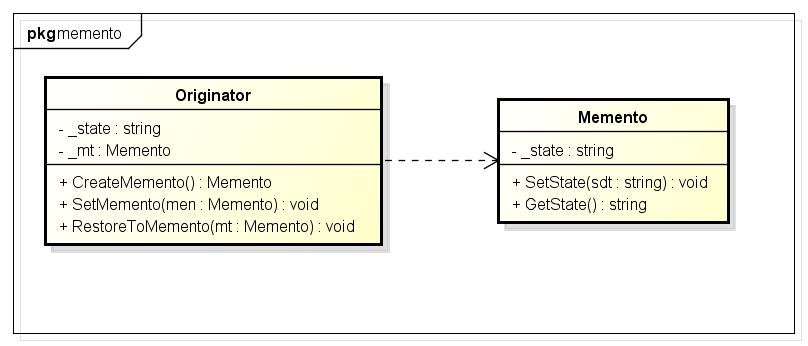- Published on
设计模式(18)——备忘录 Memento
- Authors

- Name
- Leon
十八、Memento(备忘录模式,别名 Token 对象行为模式)
1. 意图:
在不破坏封装性的前提下,捕获一个对象的内部状态,并在该对象之外保存这个状态。这样以后就可将该对象恢复到原先保存的状态。
2. 适用:
- 必须保存一个对象在某一个时刻的(部分)状态,这样以后需要时它才能恢复到先前的状态。
- 如果用一个接口来让其它对象直接得到这些状态,将会暴露对象的实现细节并破坏对象的封装性。
3. 效果:
- 保持封装边界
- 它简化了原发器
- 使用备忘录可能代价很高
- 定义窄口和宽接口
- 维护备忘录的潜在代价
4. 类图:

5. C++实现:
- 编写一个备忘录类
Memento,有一个 State 对象_state,用于存储原发器对象的内部状态。 - 编写一个原发器类
Originator,有一个函数Memento* CreateMemento();,用于创建一个备忘录,一个函数void RestoreToMemento(Memento* mt);用于恢复状态。 - 在
Memento中将Originator声明为友元类friend class Originator,保证只有 Originator 可以访问 Memento 的内部信息,但其他类不能。 - Memento 的构造函数声明为私有的,保证只能由
Originator通过CreateMemento()来创建。
Memento.h
//Memento.h
#pragma once
#include <string>
using namespace::std;
typedef string State;
class Memento {
public:
~Memento();
private:
//这是最关键的地方,将 Originator 声明为 friend 类,可以访问内部信息,但是其他类不能访问
friend class Originator;
Memento();
Memento(const State& sdt);
void SetState(const State& sdt);
State GetState();
private:
State _sdt;
};
Memento.cpp
//Memento.cpp
#include "Memento.h"
Memento::Memento() {}
Memento::Memento(const State& sdt) {
_sdt = sdt;
}
Memento::~Memento(){}
State Memento::GetState() {
return _sdt;
}
void Memento::SetState(const State& sdt) {
_sdt = sdt;
}
Originator.h
//Originator.h
#pragma once
#include <string>
using namespace::std;
class Memento;
class Originator {
public:
typedef string State;
Originator();
Originator(const State& sdt);
~Originator();
Memento* CreateMemento();
void SetMemmento(Memento* men);
void RestoreToMemento(Memento* mt);
State GetState();
void SetState(const State& sdt);
void PrintState();
protected:
private:
State _sdt;
Memento* _mt;
};
Originator.cpp
//Originator.cpp
#include "Originator.h"
#include "Memento.h"
#include <iostream>
using namespace::std;
typedef string State;
Originator::Originator() {
_sdt = "";
_mt = 0;
}
Originator::Originator(const State& sdt) {
_sdt = sdt;
_mt = 0;
}
Originator::~Originator() {}
Memento* Originator::CreateMemento() {
return new Memento(_sdt);
}
State Originator::GetState() {
return _sdt;
}
void Originator::SetState(const State& sdt) {
_sdt = sdt;
}
void Originator::PrintState() {
cout << this->_sdt << "......" << endl;
}
void Originator::SetMemmento(Memento* men) {
this->_mt = men;
}
void Originator::RestoreToMemento(Memento* mt) {
this->_sdt = mt->GetState();
}
main.cpp
//main.cpp
#include "Memento.h"
#include "Originator.h"
#include <iostream>
using namespace::std;
int main(int argc, char* argv[]) {
Originator* o = new Originator();
o->SetState("old"); //备忘前状态
o->PrintState();
Memento* m = o->CreateMemento(); //将状态备忘
o->SetState("new"); //修改状态
o->PrintState();
o->RestoreToMemento(m); //恢复修改前状态
o->PrintState();
return 0;
}